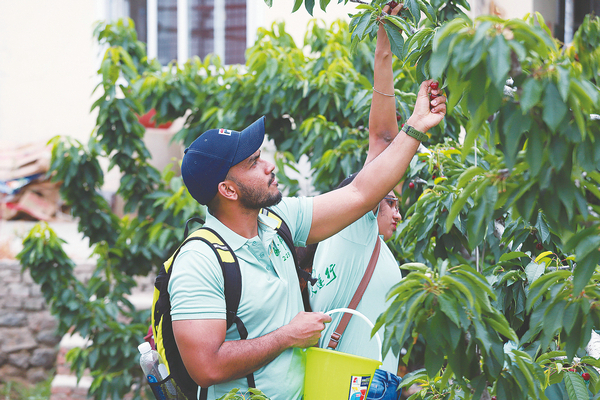Reaping the fruits of labor


In recent years, Cha'an village has worked hard on the integration of urban and rural areas and the building of a more developed countryside. It has witnessed remarkable progress in promoting a good rural living environment and healthy lifestyle for the villagers as well as the construction of an ecological civilization.
It has won many honorary titles, including being named one of the top 20 ecological and civilized villages in Dalian, a characteristic village in Liaoning province featuring leisure agriculture and rural tourism, and a national agricultural tourism demonstration site.
At the village, Shen Dongzhen, an associate professor of DUFE, gave a lecture on how China is dealing with rural issues, covering topics such as solving the "Three Rural Issues" and the rural vitalization strategy.
Student representatives from China, Russia, India, Yemen, Thailand and South Africa also shared information on the state of agriculture in their own countries and discussed issues related to food security and agricultural imports and exports.
"Rural areas in different countries have different characteristics, but some problems are universal," said Samaniego. "In this village, we see a Chinese solution. The environment here is good and efforts are being made to create local employment opportunities for villagers."
Samaniego, who went to DUFE to study for a master's degree in 2016, said she enjoys her life in China.
"I can say that China has given me everything, including my husband," she joked. She met her Russian husband, Takhir Khamidullin, at the university. Both of them are now PhD candidates.
The activity was sponsored by the China Scholarship Council, a nonprofit organization affiliated with the Ministry of Education, and co-organized by the publicity department of the Dalian Committee of the Communist Party of China and DUFE.
Since 2016, more than 600 international students from over 60 countries have participated in the activity program. Participating students have visited the Dalian Jinpu New Area, Wangfangdian, and many other areas of the coastal city, deepening their understanding of the city and the country as a whole.

The couple has participated in the program several times. This time, they expressed a desire to interact more with the local people to get a deeper understanding of their lives.
"At the kindergarten, we played games together with the children. But the language barrier limited our communication with them," said Khamidullin, 29.
"I saw a villager practicing calligraphy on the ground at the square. He wrote with a brush and bucket of water," he recalled. "If I could speak more Chinese, I might have started a conversation with him, asking how he felt when he saw his beautiful calligraphy disappear off the ground so soon."
Pakistani student Ahmad Aziz Sheikh, 27, also expressed an interest in getting closer to the local people and gaining a better understanding of their way of life.
He often shares videos on social media that document his life in Dalian, and his friends back home were surprised to see a different side of China through his videos.
"Everyone is curious about the lives of ordinary Chinese people, what they eat, and how they live," he said.
"Although most of the people we met in the village are friendly, we can't get to know them more because of the language barrier," he added.
Syed Hussain Murtaza, 27, also from Pakistan, also uses social media to share his China experiences.
"Up till now, one of my most-liked posts is of some photos I took at a local temple," he said. "I felt a sense of freedom there, without being treated differently for being a foreigner. No one stopped me from doing anything."
Murtaza said he hopes to stay in China for longer and will keep sharing his stories to help more people in other parts of the world get to know the country better.
zhangxiaomin@chinadaily.com.cn




































